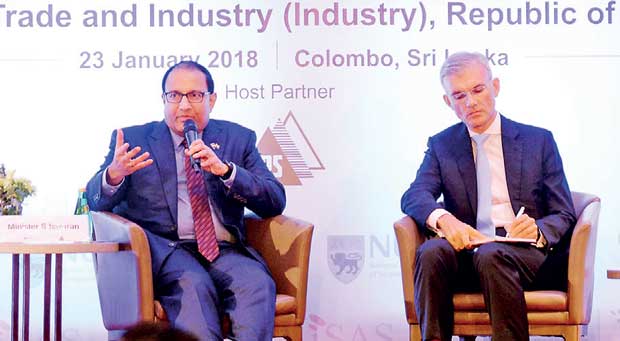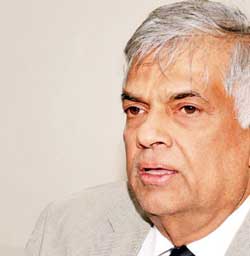24 Jan 2018 - {{hitsCtrl.values.hits}}
 Singaporean Minister for Trade and Industry (Industry) S. Iswaran (left) and Institute of Policy Studies Chairman Professor Razeen Sally
Singaporean Minister for Trade and Industry (Industry) S. Iswaran (left) and Institute of Policy Studies Chairman Professor Razeen Sally
Pic by Pradeep Pathirana
By Chandeepa Wettasinghe
In the post-free trade agreement (FTA) era, the Sri Lankan and Singaporean governments now have to create a comprehensive trade and investment plan in a collaborative manner to boost bilateral commerce, according the Singaporean Minister for Trade and Industry (Industry) S. Iswaran.
“The governments, of both Singapore and Sri Lanka, have to now identify the sectors of priority, list out the requirements and then facilitate business,” he said yesterday at the ISAS Colombo Colloquium hosted by the Institute of Policy Studies.
Iswaran yesterday signed the Sri Lanka-Singapore FTA along with his Sri Lankan counterpart, Development Strategies and International Trade Minister Malik Samarawickrama, during the state visit of Singaporean Prime Minister Lee Hsien Loong.
Iswaran said that Singaporean companies are interested in entering Sri Lanka’s infrastructure, tourism and hospitality, manufacturing and e-commerce industries.
“Singaporean investors are looking for new opportunities in the South Asian region to diversify their portfolios, and Sri Lanka ticks all the boxes,” he said, adding that Sri Lanka is an easier destination to do business when compared to its neighbours in South Asia.
Sri Lanka too could use the services and investment chapters to increase exports to Singapore and set up businesses there, while using the opportunity to closely observe the economic relationships within the Association of South East Asian Nations (ASEAN), Iswaran said.
According to the agreement, the rules of origin under the FTA calls for 35 percent value addition to be eligible for trade through the facility.
Sri Lanka will liberalize tariffs on 80 percent of products from Singapore, with 50 percent of the tariff lines, or around 3,600 products being cut immediately to zero, while 15 percent of the tariff lines would be liberalized over the first six years, and the remaining 15 percent over the next six years for a total period of 12 years of gradual liberalization.
Singapore is the third largest import sourcing country for Sri Lanka, and most of the trade with Singapore will remain outside the FTA, similar to the past FTAs Sri Lanka has signed with India and Pakistan, due to petroleum products being in Sri Lanka’s negative list, and nearly 60 percent of imports from Singapore being petroleum products.
The bilateral trade flows have traditionally been in favour of Singapore, with US$ 1.18 billion worth of imports from Singapore, while Sri Lanka’s exports amounted to US$ 114 million in 2016.
Iswaran said that the FTA includes chapters on services, investment and government procurement, in addition to the chapter on goods.
Mode 4, or the movement of natural persons was not included in the agreement, although there is some liberalization in movement of persons under the services chapter and Singapore’s unilateral liberalization.
Sri Lanka’s past FTAs had focused on trading of goods, making the FTA with Singapore the first comprehensive agreement Sri Lanka has signed, and sends a signal that Sri Lanka is ready to do business at an advanced level, Iswaran said.
He added that the investments chapter outlines how to deal with investments in a transparent and clear manner.
“The investment chapter talks about how investments will be treated, how disputes will be resolved, and arbitration type of arrangements can be made. It injects confidence to the business community, especially those which entail significant capital investment,” Iswaran said.
He said that the government procurement chapter will create competition for sourcing resources for the public sector of Sri Lanka.
At a time when anti-globalization rhetoric is being heard loudly, signing the Sri Lanka-Singapore FTA is significant, he added. In Sri Lanka too, the protectionist lobbies have at the last moment opposed the signing of the FTA.
Iswaran stressed that although Singapore too has its own challenges, globalization has been inculcated into Singaporean businesses.
“We tell them that if they are protected, they cannot compete,” he said.
The benefits of globalization have to be felt by all as well, Iswaran added.
“It is equally important for the governments to focus on local aspects. There are local businesses and stakeholders who need to be targeted to bring them the benefits of globalization,” he said.
By Harshana Sellahewa
Prime Minister Ranil Wickremeisnghe said yesterday the newly inked Free Trade Agreement (FTA) between Sri Lanka and Singapore would lead the way for several such other trade pacts in the future.
 “Today we signed the free trade agreement with Singapore—the first one signed in about 15 years.
“Today we signed the free trade agreement with Singapore—the first one signed in about 15 years.
I hope it will lead the way to others because as the global economy expands, our market has to expand,” Wickremsinghe told the Annual General Meeting of the National Chamber of Commerce of Sri Lanka, last evening in Colombo.
Sri Lanka already has FTAs with India and Pakistan and is working towards getting into more bilateral trade agreements with several other countries including Bangladesh and Malaysia. In the pipeline is also an extension to the current FTA with India.
In comparison, Singapore has 21 bilateral and regional FTAs with 32 trading partners.
Meanwhile, Wickremesinghe said following the FTA signing, there will be investment seminars by the end of February in Singapore for which he is planning to attend.
He also said the much-awaited Anti-Dumping and Countervailing Duties Bill will be presented to Parliament today.
20 Nov 2024 33 minute ago
20 Nov 2024 1 hours ago
20 Nov 2024 1 hours ago
20 Nov 2024 2 hours ago
20 Nov 2024 2 hours ago